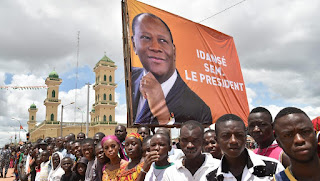Cote d'Ivoire opposition wants new electoral commission; some still question president's nationality
 |
| Supporters of President Alassane Ouattara when he arrived in Daloa, Ivory Coast, September 27, 2015.AFP PHOTO / ISSOUF SANOGO |
The same article mentions that protestors question Ouattara's nationality. Unlike America birthers, these protestors don't necessarily question whether Ouattara was born in Cote d'Ivoire - his Ivoirité is questioned based on the birthplace of his parents. In 1994, an Electoral Code was adopted that required not only the presidential candidate to be born in Cote d'Ivoire, but also BOTH of his or her PARENTS. I'm not sure if it's known where Ouattara was born - he himself was reportedly born in 1942 near what is today the political capital, Yamoussoukro, almost 20 years before Cote d'Ivoire's independence. It is rumored that at least one of his parents was born in modern-day Burkina Faso. Most people believe this new rule was adopted to prevent Ouattara from running.
In 2000, this exclusionary rule was enshrined in a new constitution. In December 2004, the National Assembly abolished the need to have Ivorian parents to be president (according to the Political Handbook of the World, p. 347, the new law required just one parent to be Ivorian). I suppose a case could be made that if the constitution wasn't amended, then a law passed by the National Assembly is not enough to change the criteria to serve as president. But of course I'm not a constitutional scholar.
In any case, although it sounds crazy to say that a president who is finishing his first term and is running for a second was never legally qualified to run for president in the first place, there does seem to be an arguable foundation for that argument.
Nonetheless, Ouattara probably doesn't need a biased electoral commission to win re-election. GDP has been growing at 9% annually for the past three years and Ouattara is heavily favored to win re-election.


Comments
Post a Comment